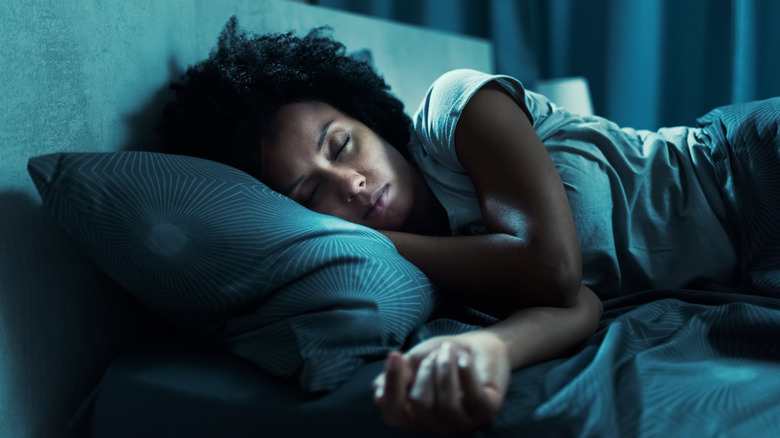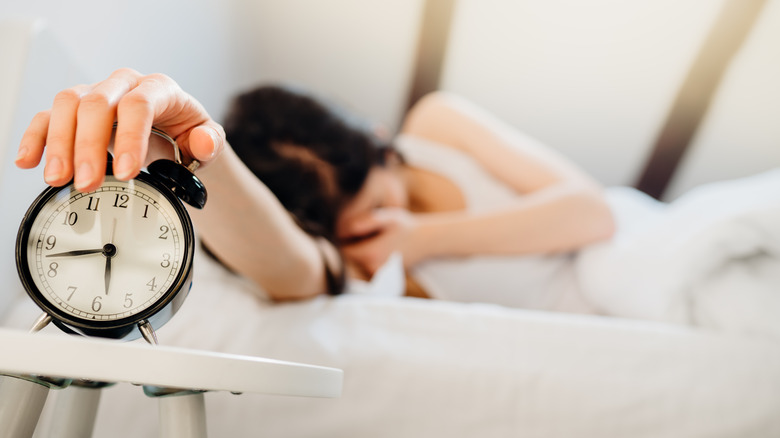How Can You Prevent Sleep Paralysis?
Have you ever woken up in the middle of the night with the terrifying feeling that you can't move? If so, you may have experienced sleep paralysis. Surprisingly, this condition, when it occurs during REM sleep, is considered normal (via Stanford Medicine Health Care). When it occurs outside of REM sleep, however, then it becomes more of a problem. In general, the condition lasts anywhere from seconds to minutes and, in some cases, can cause hallucinations. According to a 2011 study by Sleep Medicine Review, less than 8% of the population tends to experience sleep paralysis. Plus, the condition is particularly common among students and psychiatric patients.
The American Academy of Sleep Medicine notes that, during REM sleep, your muscles are kept still by your brain during sleep, a condition known as atonia. This can keep you from flailing around or lashing out during your dreams. When you wake up while the atonia is still in effect, this can cause sleep paralysis. During these episodes, a person may find it impossible to move their limbs, leading to feelings of anxiety and, in some cases, panic. Usually, sleep paralysis stops on its own, or it can end when someone shakes you awake. Luckily, you can take some steps to keep it from happening in the first place.
Poor sleep hygiene is a possible cause
There is no clear-cut cause for sleep paralysis, according to the National Health Service (NHS). However, it can be traced back to such conditions as insomnia, narcolepsy, anxiety, and family history. One can also suffer episodes of sleep paralysis due to a disruption in your regular sleep pattern, such as jet lag or working a long shift at work.
If your episodes of sleep paralysis are proving disruptive, you can talk to your healthcare provider about seeking treatment (via Cleveland Clinic). He or she may recommend an overnight sleep study known as a polysomnogram. This study tracks your brain activity during sleep, as well as your heart rate and breathing. The results can help your doctor detect when sleep paralysis occurs during the night. In fact, your doctor may also recommend a sleep diary to keep track of your symptoms for a few weeks, according to WebMD.
While Cleveland Clinic notes that there is no proven method of treating sleep paralysis, there are steps you can take to help prevent episodes from happening. Proper sleep hygiene is most important, as well as creating a sleep schedule that you stick to, not using devices, such as phones or tablets, before bedtime, and creating a bedroom environment that is conducive to a good night's rest.
Lifestyle changes may make a difference
In cases where narcolepsy may be the culprit, your doctor may consider prescribing drugs such as fluoxetine, commonly known as Prozac, or other selective serotonin reuptake inhibitors, to help keep the condition under control (via Healthline). However, other times, making some changes to your lifestyle can make a big difference when it comes to managing episodes of sleep paralysis. These include getting regular exercise, reducing your stress, and sleeping on your side. In addition, you should monitor the medications you take, as well as their side effects.
If your sleep paralysis is triggered by psychiatric issues, such as bipolar disorder, the American Academy of Sleep Medicine recommends that you discuss your condition with your doctor or psychiatrist, as they can recommend the proper medication and correct dosage to help manage your symptoms. Sometimes, you may also need cognitive behavioral therapy to help get you through bouts of sleep paralysis. Your doctor is always your best resource when dealing with this condition, as he or she can help determine what may be causing it and how you can treat it safely and effectively.



